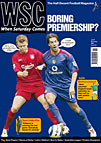 XLeeds United and fiscal responsibility may not have belonged in the same sentence in years past, but as Duncan Young explains, they might just be turning it around
XLeeds United and fiscal responsibility may not have belonged in the same sentence in years past, but as Duncan Young explains, they might just be turning it around
Ken Bates must be delighted that, despite the uproar surrounding ticket price rises at Leeds, crowds are up by 44 per cent. That is, of course, compared to the opening three home games of 1986-87, the season following Leeds’s last 14th place finish in the second tier. To find comparable gates to this season you need go back 18 seasons, to just after Leeds missed both promotion and an FA Cup final by minutes. The surprising thing is not that Leeds are getting crowds of 21,000 this season, but that they averaged 8,000 more in last year’s grim campaign directly following relegation.
“Highest prices in the Championship!” scream the headlines. While that is true of a comparatively small number of £45 tickets, adults can also pay as little as £20 for category B games. Sheffield United charge £19 for equivalent tickets, while Wolves’ cheapest adult seats for any league match are £23.
There was an outcry last spring when this season’s prices became known and there’s no doubt that some have been discouraged from attending, not so much by the amounts themselves as the rise from last season. The strongest reaction has been from fans with season tickets in central touchline sections, particularly the family area, who claim they are being priced, or forced because of ground improvements, out of long-held seats. Some moved with great reluctance, others took it as a cue to leave.
Many of the 20,000 that still attend claim they’re happy to be rid of the “prawn sandwich brigade”. In saying that they’re failing to appreciate what’s happening. Ken Bates appears merely to be echoing the instincts of his former right-hand man at Chelsea and recent Leeds chief executive Trevor Birch, who said in Phil Rostron’s book Leeds United: Trials and Tribulations: “We are talking quality corporate capacity at Leeds of less than 1,200 a year, whereas with Newcastle and Chelsea you’re at 5,500-6,000 and that can make £10 million of revenue difference. I do believe there are people out there who would actually come and pay more money to watch Leeds United if the facilities were here.”
Such reasoning is inevitably unpopular with most fans. Nevertheless, history suggested many of last year’s 29,000 wouldn’t be back anyway and Bates has wasted no time in starting to maximise the club’s commercial potential. In defence of his changes he lists the millions still due to the Inland Revenue, former staff and the ground’s new owners. He also cites the money given to manager Kevin Blackwell to build a competitive side. Regarding attendances, he argues that 1,500 of the missing were on freebies and emphasises how many business customers are “flooding back”. More controversially, he suggests some in the family area had long since lost their qualification to sit there.
Bates has publicly asked anybody with better ideas to come forward. The Leeds United Supporters’ Trust stepped up in July with an open letter suggesting Leeds attract stay-away fans by following Fulham’s innovative strategy of offering “season tickets” for a self-chosen six or ten matches. The flaw in that plan is that Fulham have six games per season that are guaranteed sell-outs, one or two of which they can offer in these packages to boost attendances at less glamorous fixtures. This season Leeds have shut the upper section of the vast East Stand and the last home game where tickets were unavailable on the day seems a distant memory.
Leeds might make more headway by following fellow 2004 relegation victims Leicester in their policy of using different headline concessions for each home game, £5 tickets for members here, children in for £1 there. Such a move might please fans who back Bates but are still concerned about losing the next generation of supporters. The latter might be attracted more by events at the arena Bates is pushing to be built next door, alongside hotels and conference facilities in his vision for “Elland City”. That idea sounds familiar.
From WSC 225 November 2005. What was happening this month